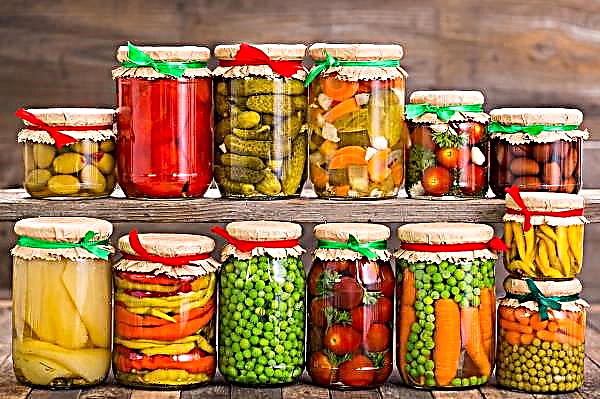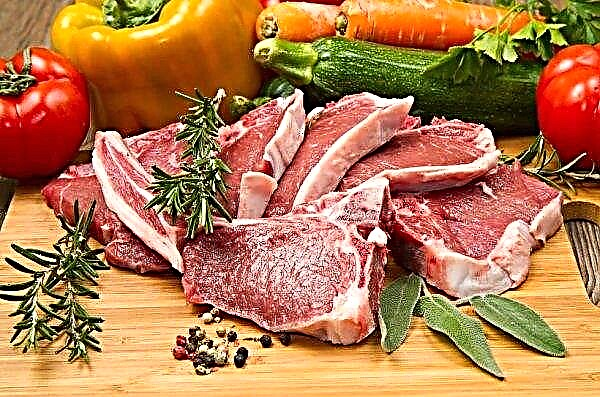A lot is known about the beneficial properties of onions, but far from all people understand the nuances of its effect on various organs and systems of the human body. We suggest that you carefully study this issue and find out what are the reasons for the periodic need for this vegetable, in what form it is better to use it, and what side effects should be feared.
Did you know? On the territory of modern Europe, they began to grow onions in the Bronze Age, but the plant got its present name thanks to C. Linnaeus, who initially associated it with the Celtic word “all”, that is, “burning”.
Useful properties of onions
In modern stores you can find a variety of types of onions, not only onions, but also red or feather green, perfectly complementing any salad. In all these cases, vegetables have similar characteristics that help strengthen immunity, stimulate the digestive activity of the stomach, help fight stress and have a positive effect on the body in the fight against cancer processes.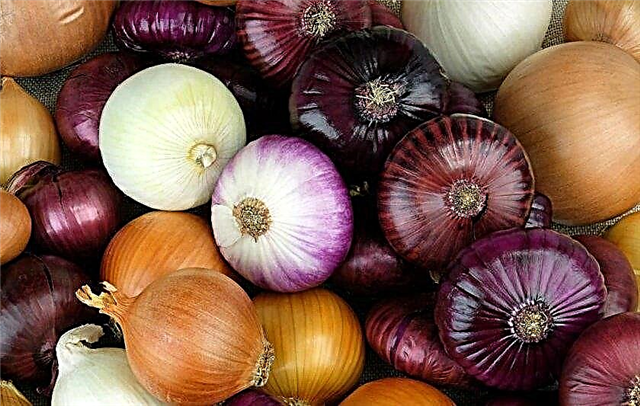
Immunity strengthening
Strengthening the body's defenses during a period of high activity of viral and catarrhal diseases is explained by the high content of ascorbic acid in onions, a strong antioxidant, with the help of which the human body forms collagen bonds. This means that in addition to strengthening immunity, regular use of the vegetable can increase skin elasticity, bone strength and blood vessel elasticity. People with weak immunity and bone problems often want onions precisely because the body responds to a lack of ascorbic acid.
Did you know? In times of severe stress, the human body exudes onion or garlic aroma. This conclusion was made by Japanese scientists led by Masako Katsuyama, who studied in 2018, 500 volunteers aged 20-70 years.
Stimulates digestion
Oligosaccharides present in onions have a positive effect on digestive processes, as they contribute to the release of gastric and pancreatic juices. However, with gastrointestinal diseases (especially ulcerative processes), the use of bulbs is very undesirable, which is explained by irritation of the mucous membrane and aggravation of the problem.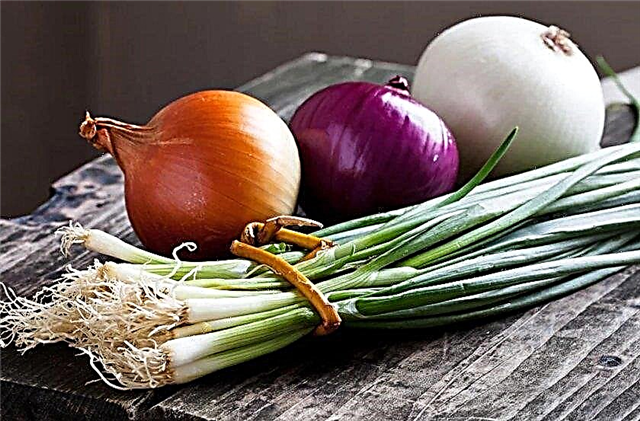
Oncology benefits
To prevent the development of cancer of the stomach, larynx and prostate gland, sulfides present in the onion, as well as anthocyanins, effectively protecting the body from pathogens and bacterial effects, help. In addition, the vegetable contains the substance quercetin, which neutralizes free radicals in the tissues of the body (it is they that cause the formation of cancer cells). Most of the quercetin in red varieties of vegetables, although ordinary onions are also not without them.
Important! When choosing a drug for the complex treatment of vitamin-mineral deficiency, pay attention only to multivitamin formulations, with the maximum number of useful components. The most effective in this regard will be vitamins for pregnant women.
Stress management
In the fight against nervous excitement and emotional exhaustion, garlic helps to cope well, but in its absence you can use onions. In this case, the main therapeutic component is iron, which is part of hemoglobin and activates hematopoietic processes.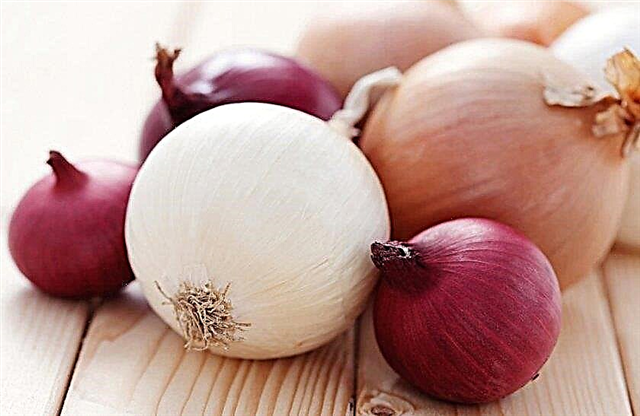
Why do you want onions: what is missing in the body
Given the rich vitamin and mineral composition of onions, it is logical to assume that most of all it is wanted by people who are deficient in certain components.
Consider the following possible violations:
- Vitamin C Deficiency Every day, a person should consume at least 200 g of this substance, and if it is lacking, you will most likely want citrus fruits or the same onions.
- Low iron content in the blood. In this case, only an appropriate blood test will help to make guesses, and to replenish iron reserves it is useful to eat pomegranate, red meat, eggs, sour cream, dried apricots and pumpkin. Nuts, preferably walnuts, will be useful.
- Lack of selenium. This mineral is especially useful for normalizing metabolic processes and the full activity of the pancreas and thyroid glands, but as in the previous case, its level can only be determined by an extensive blood test. In addition to onions, people with a low selenium content may want legumes, seafood, and nuts.
- Lack of B vitamins in the body (especially B1, B6, B9), which provoke a violation of the nervous system and problems in metabolic processes. Notice the lack of these components is easy to worsen the condition of the skin, hair and nails.
- The presence of a viral infection in the body. It is possible that the desire to eat the bulb will appear during the period of active spread of viral infections or in the initial stages of the development of the disease.
- Potassium deficiency manifested in increased fatigue, palpitations, sometimes constipation, cramps and cramps.
- Decrease in the body’s immune forces especially during seasonal exacerbations of diseases.
Important! Refined sunflower oil is an excellent source of cholesterol, which has a devastating effect on the vascular network. If possible, it is best to refrain from constantly cooking onions by frying.
Simply put, if you can’t get rid of the desire to eat an onion, and even a whole head does not help satisfy your hunger for a long time, you should include complex mineral and vitamin formulations in your diets. They not only help to increase the body's defenses, but also normalize the activity of various organs and systems that previously lacked nutritional components.
Onion Consumption
Many experts, even healthy people, are not advised to eat more than 150 g of vegetables per day, but in fact, it is quite difficult to determine the rate of consumption of the product for each individual: here you can not ignore the weight and age. To roughly calculate how much onion you need per day, it’s worth considering that only 100 g per day can provide the body with half the daily allowance of vitamins A and C.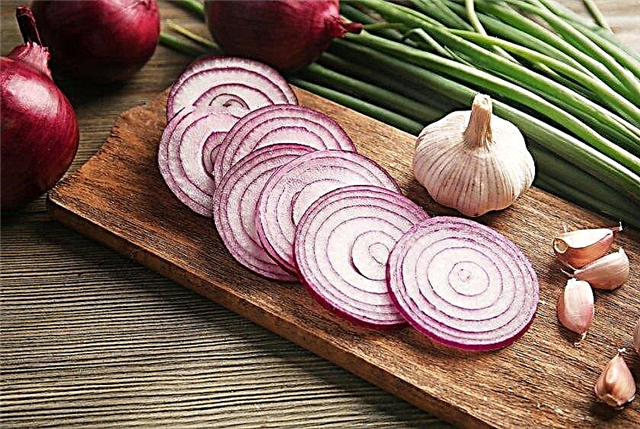 In the absence of other sources of such useful components, several bulbs with a total weight of 200 g can be eaten during the day. The required amount of other nutrients is calculated by the same principle, and you can not worry about being overweight, since any type of plant is reasonably considered low-calorie (on average - 40 kcal per 100 g of product).
In the absence of other sources of such useful components, several bulbs with a total weight of 200 g can be eaten during the day. The required amount of other nutrients is calculated by the same principle, and you can not worry about being overweight, since any type of plant is reasonably considered low-calorie (on average - 40 kcal per 100 g of product).
In what form is it better to eat onions
The maximum amount of vitamin-mineral components is contained in raw onions, therefore it is not surprising that it is desirable to use it in this form. Any heat treatment destroys a significant part of the useful components, especially if the vegetable is fried or stewed in combination with spices and other products.
If it is impossible to do without heat, then it is advisable to use the most gentle methods: steaming or baking in the oven. When frying in a pan, monitor the quality of the oil and, if necessary, periodically replace it.
Possible harm and contraindications to the use of onions
The useful properties of onions are not in doubt, but, unfortunately, one should not forget about the possibility of negative effects on the body. Often, such situations are associated with the health and characteristics of the state of individual organs and systems.
Therefore, in the first place, the following people need to be attentive to the use of vegetables:
- prone to allergic reactions and those who have already experienced the appearance of itching or rashes after eating a burning plant;
- suffering from stomach ulcers and various forms of gastritis;
- having problems with the kidneys and liver, especially at the stage of exacerbation of the disease;
- suffering from high blood pressure (in some cases, onions increases it even more) and excessive excitability of the nervous system.
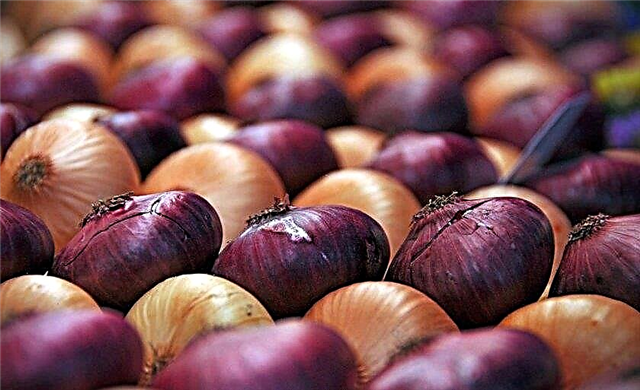 With caution, the use of the plant should be suitable for people prone to cardiovascular diseases, in particular, those at risk, as well as pregnant women in the second trimester, since a burning vegetable further increases the likelihood of heartburn and unpleasant belching.
With caution, the use of the plant should be suitable for people prone to cardiovascular diseases, in particular, those at risk, as well as pregnant women in the second trimester, since a burning vegetable further increases the likelihood of heartburn and unpleasant belching.Onion Eating Recommendations
The method and amount of onion used directly depends on what purpose you pursue from its use. If it is needed only as an addition to dishes, then you should focus on taste, but to eliminate the vitamin-mineral deficiency, you will have to eat a certain amount of vegetable every day. However, in any of these cases, it is advisable to use only fresh bulbs containing the maximum supply of all useful components.
Even peeled and cut specimens in the open air lose a significant part of their nutrients, not to mention fried or stewed varieties that have undergone serious heat treatment. At the same time, if we are talking about people suffering from gastrointestinal diseases, then cooked onions will be much more useful than fresh ones, since they will not irritate the stomach.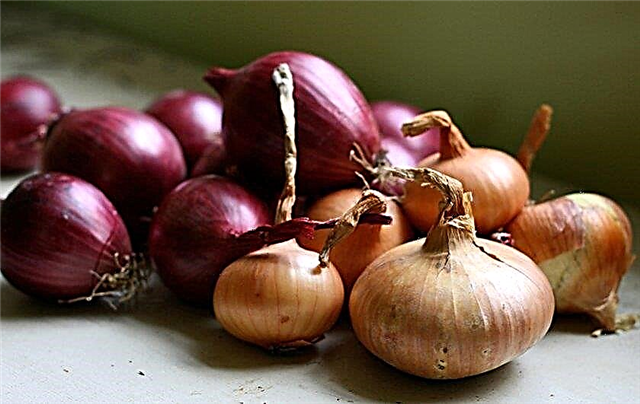 For preventive purposes, eating a vegetable is not necessary. You can simply cut the onion and inhale for a while the essential oils coming from the fresh middle. No less useful will be onion inhalations prepared from the husks of vegetables. If you are very attracted to onions, do not deny yourself such a “delicacy”, just follow the measure in everything, preferring raw rather than fried vegetables.
For preventive purposes, eating a vegetable is not necessary. You can simply cut the onion and inhale for a while the essential oils coming from the fresh middle. No less useful will be onion inhalations prepared from the husks of vegetables. If you are very attracted to onions, do not deny yourself such a “delicacy”, just follow the measure in everything, preferring raw rather than fried vegetables.



